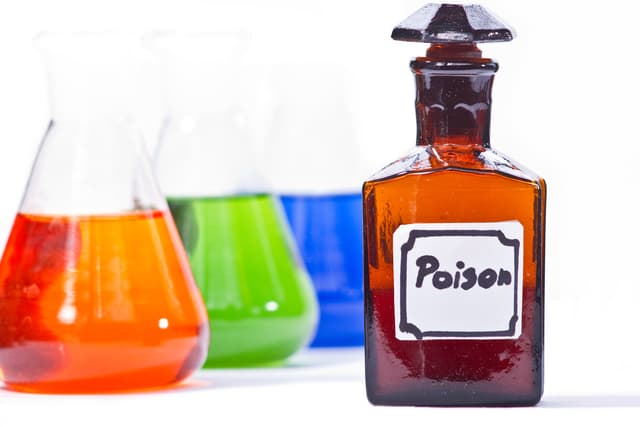Common Pet Poisons: Keeping Your Furry Friends Safe
As responsible pet owners, ensuring the safety and well-being of our beloved furry friends is of utmost importance. While we may take great care in providing a loving home and a healthy environment, there are hidden dangers lurking within our households that can pose significant risks to our pets. In this blog post, we will explore some common pet poisons and provide valuable information on how to keep your dogs safe. For Paws Dog Training in Northern Kentucky is dedicated to not only training your pets but also educating pet owners about potential hazards. Let’s dive in!
- Human Medications:
Many common over-the-counter and prescription medications that are harmless to humans can be toxic to dogs. Medications such as painkillers, antidepressants, and even common over-the-counter drugs like acetaminophen and ibuprofen can lead to serious health complications if ingested by our furry companions. It is essential to keep all medications securely stored away from your pet’s reach and only administer medications prescribed by your veterinarian.
- Household Cleaners:
While we rely on household cleaners to maintain a clean and hygienic living environment, some of these products can be toxic to our pets. Cleaning solutions containing bleach, ammonia, or phenols can cause respiratory distress, gastrointestinal upset, or even chemical burns if ingested or inhaled by our furry friends. When using such products, ensure your pet is in a separate room, and after cleaning, allow sufficient time for the area to be well-ventilated before reintroducing your pet.
- Toxic Foods:
Certain foods that are safe for humans can be highly toxic to dogs. Chocolate, grapes, raisins, onions, garlic, and xylitol (a sugar substitute found in many sugar-free products) are just a few examples. These substances can cause severe gastrointestinal upset, organ failure, or even be fatal to your pet. It is crucial to educate yourself about the foods that are harmful to dogs and to always keep them out of reach.
- Plants and Flowers:
While plants and flowers bring beauty and freshness to our homes, some varieties can be toxic to dogs. Common household plants such as lilies, azaleas, daffodils, and tulips can cause symptoms ranging from mild gastrointestinal upset to more severe issues like kidney failure. Before introducing any new plants or flowers into your home, research their toxicity levels and ensure they are safe for your furry friends.
- Rodenticides and Insecticides:
To combat pests, many households use rodenticides and insecticides. However, these products can be highly toxic to pets if ingested. It is essential to keep these chemicals out of your pet’s reach and, if possible, opt for pet-friendly alternatives. If you suspect your pet has been exposed to these substances, seek immediate veterinary attention.
- Household Toxins:
Various household items can pose a danger to our furry friends. For example, antifreeze contains ethylene glycol, which is highly toxic to dogs and can cause kidney failure. Cleaning products, batteries, certain types of glue, and even certain types of plants like the Sago palm can also be hazardous if ingested. Ensure that these items are stored securely and away from your pets.
Common Listings:
- Acetaminophen – found in Tylenol and other meds
- Batteries
- Chocolates – Any chocolate, especially bakers chocolates and cocoa bean mulch that you use in a garden can be a problem
- Detergents – Concentrated laundry pods can cause illness and if inhaled into the lungs can cause breathing problems
- Ethylene Glycol – Which is found in antifreeze and de-icing agents, a teaspoon can cause kidney failure in cats and dogs
- Fertilizers – Contain poisonous amounts of nitrogen phosphorus, potassium, iron and zinc, and some herbicides and pesticides
- Grapes – Resins, currants and even grape juice can cause kidney failure
- Household Cleaners – Bleach, drain cleaners ammonia, toilet bowl cleaners can cause stomach issues
- Insecticides – In flea-control can cause problems if not used accordingly. So don’t use a flea-control that is for 50 pound dog on your 25 pound pup
- Java – or coffee can cause vomiting and diarrhea and seizures. Even coffee grounds can cause issues
- Kerosene – Gasoline and tiki torch fluids can cause breathing issues and instability
- Lilies – Can cause kidney failure
- Marijuana – Can be toxic to dogs and cats if ingested by itself or in a food product. Also can be dangerous if inhaled boy cats or dogs
- Nonprescription Meds – Non-steroidal anti-inflammatory drugs can cause kidney or liver failure. Manny of these meds have a candy coating on them which makes them appealing to dogs
- Onion – Garlic leeks and chives in dogs and cats can be toxic
- Prescription Meds – Such as Adderall, antidepressants and cardiac drugs are eaten by pups. Topical meds can also be absorbed by pets. Don’t let them lick your skin after you apply these meds
- Queensland Nuts – Macadamia nuts can cause vomiting and difficulty walking
- Rodenticides – Such as mouse and rat poisons contain a number of toxins and issues for dogs and cats
- Sago Palms – One of many types of plants that a toxic
- Tobacco – Any type of tobacco, nicotine, cigarettes and patches can cause serious problems
- Unbaked Bread Dough – Can expand in the stomach and cause bloat or a turning stomach which cuts off blood supply. Yeast can also be toxic
- Veterinary Prescriptions – Such as arthritis meds, meat flavoring are appealing to dogs and can cause kidney failure
- Windshield Wiper Fluid – Contain methanol or ethylene glycol and if ingested can cause serious illness
- Xylitol – Sugar free sweetener commonly found in gum, breath mints, toothpaste and some peanut butter. All can cause drop in blood sugar
- Yard Products – Snail and slug bait, herbicides and fertilizers cause issues for you dog or cat
- Zinc – Toxicity can occur when dogs and cats eat metal or coins. If a penny is ingested, it can be fatal
Being aware of common pet poisons and taking proactive measures to prevent their exposure is essential for the well-being of our furry friends. Remember, prevention is key. By educating ourselves and creating a safe environment, we can significantly reduce the risks associated with pet poisoning. For Paws Dog Training in Northern Kentucky is dedicated to helping you keep your pets safe and providing comprehensive training programs to ensure their overall well-being. Together, we can create a happy, healthy, and poison-free environment for our beloved pets.
Contact For Paws Dog Training in Northern Kentucky at (859) 802-6076 or visit their website at https://expertk9training.com/ for more information on pet safety and training programs.
Disclaimer: The information provided in this blog post is for educational purposes only and should not substitute professional veterinary advice. If you suspect your pet has ingested a toxic substance, contact your veterinarian immediately.

